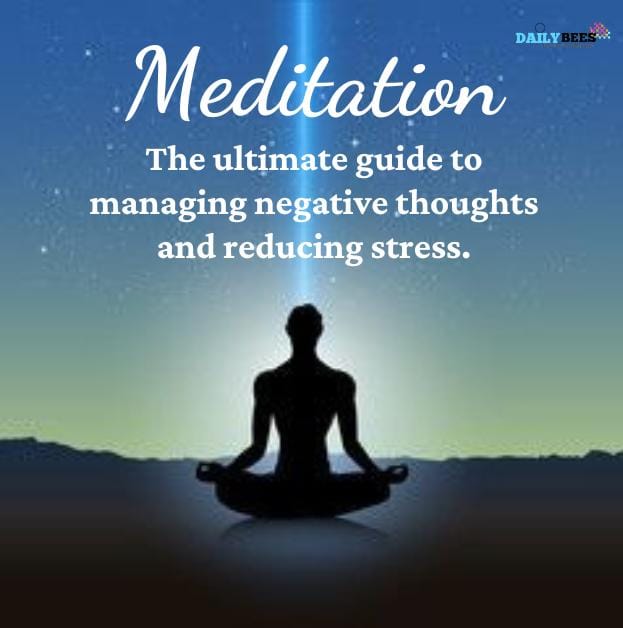Meditation:- The ultimate guide to managing negative thoughts and reducing stress
Stress, It has become a constant companion for many of us. Especially, as the world spins faster. Our lives get busier. Rooted in ancient wisdom and backed by science, regular meditation and mindfulness practices are powerful tools against stress. Before we dive into meditation methods and causes, let’s take a closer look at the causes of stress and what’s really going on in our minds.
The Causes of Stress: What You Need to Know
Everyone experiences stress. It’s an unavoidable part of life. But where does stress really come from, and what triggers it?
Stress triggers are as individual as we are. They can range from work pressures and financial worries to relationship issues and health concerns.
This is where meditation comes in. Meditation offers us a way to reduce the effects of stress, by affecting how our brain reacts to stress triggers. It helps us calm our reactions, develop a more balanced response to stress, and even befriend stress.
In short, meditation helps us manage our stress levels, not by eliminating stress (which is nearly impossible) but by changing our relationship with it.
The Benefits of Meditation: How to Reduce Stress and Live a Stress-Free Life
Meditation, especially mindfulness meditation, creates space between your thoughts and your reaction to those thoughts. Instead of getting swept up in mental activity, the practice of meditation invites you to observe what is going on in your mind without judgment.
With consistent practice, meditation can lead to concrete changes in your brain that enhance your ability to manage stress.
Meditation also helps you develop mental flexibility. The more flexible you make those mental muscles through meditation, the stronger they become. This ‘mental fitness’ can improve your ability to recover from stressful situations, rather than becoming overwhelmed.
In short, the three benefits of meditating for stress relief can be summarized like this:
- Present moment awareness:- By training yourself to live in the present moment, you’re less likely to dwell on past regrets or worries about the future.
- Acceptance:- Through mindfulness, we learn to accept our thoughts and feelings without resisting or trying to change them. It’s like saying to stress, “I see you, and it’s okay that you’re here.”
- Non-judgmental thinking:- Non-judgmental thinking helps keep self-criticism in check. Instead of judging ourselves for feeling stressed, we learn to see these moments as part of the human experience. Because of this, we can prevent stress from turning into more negative emotions like guilt or shame.
Pros and Cons of Meditation
Relaxation has many benefits, both mentally and physically:
Pros:-
- People who are physically limited may find it easier to practice than strong physical exercise for strain relief. Plus, no special equipment is needed.
- Unlike seeking help from a professional, It is free.
- Unlike some medications and herbal remedies, it has few potential side effects.
- Spiritual practice is always available and can be done anywhere and at any time.
- It is surprisingly effective in short-term discomfort reduction and long-term health.
- It is a great tool for many people, but there are a few things to keep in mind before you begin a practice
Cons:-
- It takes discipline and commitment to make relaxation a regular habit.
- Some people may find it more difficult to clear their mind of the day’s thoughts.
- Some people may have mental or physical health conditions that don’t allow them to meditate in a relaxed sitting position.
Meditation Techniques to Relieve Stress
- Mindfulness Meditation:- This practice involves focusing on your breath while recognizing and accepting the thoughts that come into your mind.
- Music Meditation:- As the name suggests, music meditation works by paying attention to the sounds and rhythms of different musical pieces. If you have tinnitus or find silence disturbing, meditating to music is a great option.
- Body Scan Meditation:- This technique involves slowly focusing on different parts of your body, from your toes to your head.
- Mantra Meditation:- In this practice, one has to silently repeat a calming word or phrase (a “mantra”) to block out distracting thoughts.
- Walking Meditation:- It includes physical activity. It’s a great option if you like to meditate in motion.
- Loving-kindness Meditation:- This practice involves mentally showing goodwill, kindness, and warmth to yourself and/or others by silently repeating a series of compassionate phrases.
Breathing Techniques for Stress Relief
- Breath awareness:- This technique brings awareness to the natural flow of the breath. It’s as simple as it sounds. Sit quietly, close your eyes, and focus your attention on the breath entering and leaving your body.
- 4-7-8 breathing:- In this breathing technique you’ll breathe in for a count of 4, hold the breath for a count of 7, and exhale for a count of 8. This slows down your breathing rate and can help calm your nervous system.
- Box breathing:- Also known as ‘square breathing’, this technique involves breathing in, holding the breath, exhaling, and holding the breath again, each time to a count of four.
- Diaphragm breathing:- For this technique, it’s important to focus on breathing from your diaphragm rather than breathing shallowly into your chest.
- Alternate nostril breathing:- This breathing technique involves alternately inhaling and exhaling from one nostril at a time. Generally, you do this while holding the opposite nostril closed with your Index finger. It’s believed to balance the left and right sides of the brain while promoting a sense of relaxation and relieving stress.
Exploring the Different Parts of Meditation
These may vary depending on which guidance you follow.
- Focusing:- Focusing your attention helps to free your mind from many of the ailments that cause anxiety.
- Quiet Environment:- If you’re just starting out, it may be easier to meditate in a quiet place.
- Comfortable Position:- You can practice it whether you’re sitting, lying down, walking, or in any other position or activity.
- Open Attitude:- Allow thoughts to pass through your mind without judging them.
The Essential Guide to Practicing Meditation
- Take Deep Breaths:- This is good for beginners because breathing is a natural function.
- Pray:- Pray is the best-known and most widely used form of relaxation.
Summary
Meditation offers many benefits, including reducing unease, increasing focus and concentration, promoting emotional health, improving sleep quality, boosting creativity, and developing self-awareness. Regular practice can have long-term positive effects on both mental and physical health.
“Include it in your daily routine and enjoy the unique benefits of doing spiritual relaxation with each breath.”
Do Meditation and Stay Positive and Anxiety-free!


































